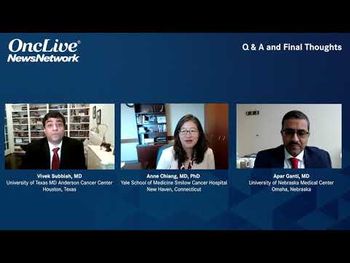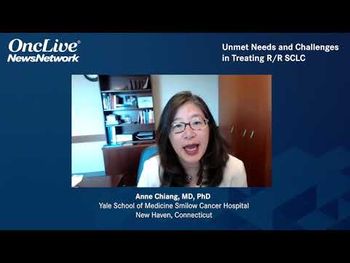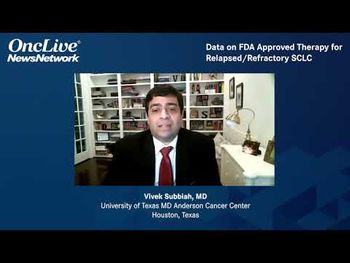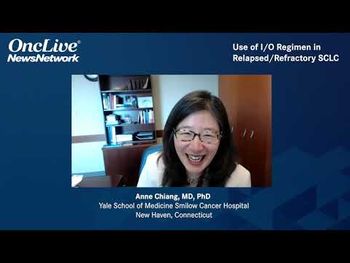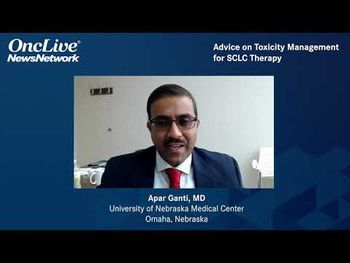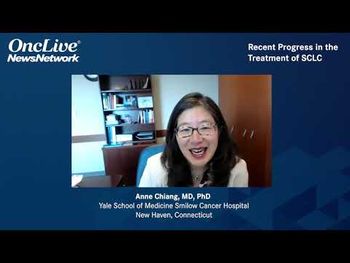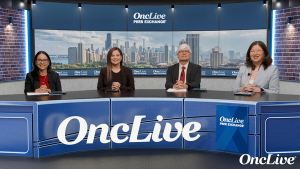Anne Chiang, MD, PhD, Yale School of Medicine Smilow Cancer Hospital
Articles by Anne Chiang, MD, PhD, Yale School of Medicine Smilow Cancer Hospital
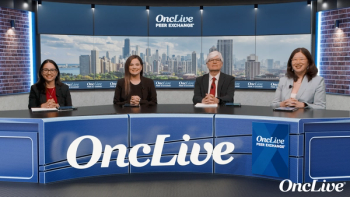
Redefining SCLC: Molecular Subtypes and Blood Biomarkers Guide Therapy
ByTiciana A. Leal, MD,Anne Chiang, MD, PhD, Yale School of Medicine Smilow Cancer Hospital,Afshin Dowlati, MD,Tarita O. Thomas, MD, PhD Key opinion leaders investigate the potential impact of redefining small cell lung cancer (SCLC) as a molecularly heterogeneous malignancy on personalized treatment strategies for SCLC subtypes with distinct therapeutic vulnerabilities, while exploring the emerging role of blood-based biomarkers in shaping the evolving treatment landscape for SCLC.

Examining the use of PD-L1 and tTMB in the CASPIAN Trial
ByTiciana A. Leal, MD,Anne Chiang, MD, PhD, Yale School of Medicine Smilow Cancer Hospital,Afshin Dowlati, MD,Tarita O. Thomas, MD, PhD Key opinion leaders examine the PD-L1 expression and tissue tumor mutational burden (TMB) data from the CASPIAN trial, which evaluated the combination of durvalumab with platinum-etoposide for extensive-stage small cell lung cancer (ES-SCLC), weighing the potential predictive value of PD-L1 and tissue TMB in assessing progression-free survival (PFS) and objective response rate (ORR) outcomes.

Overcoming Immunotherapy Resistance in Small Cell Lung Cancer
ByTiciana A. Leal, MD,Anne Chiang, MD, PhD, Yale School of Medicine Smilow Cancer Hospital,Afshin Dowlati, MD,Tarita O. Thomas, MD, PhD Medical experts specializing in small cell lung cancer (SCLC) delve into the complex topic of immunotherapy resistance, exploring potential mechanisms, clinical implications, and potential strategies to overcome this challenge in the treatment of patients with SCLC.

Predictors of Immunotherapy Response in Limited and Extensive SCLC
ByTiciana A. Leal, MD,Anne Chiang, MD, PhD, Yale School of Medicine Smilow Cancer Hospital,Afshin Dowlati, MD,Tarita O. Thomas, MD, PhD Afshin Dowlati, MD, explores which patients with small cell lung cancer experience the most significant benefit from immunotherapy in both limited and extensive stage disease, while also examining potential clinical or molecular characteristics that could serve as predictors of prolonged survival.

Examining 3-Year Update Data from the CASPIAN Trial
ByTiciana A. Leal, MD,Anne Chiang, MD, PhD, Yale School of Medicine Smilow Cancer Hospital,Afshin Dowlati, MD,Tarita O. Thomas, MD, PhD A medical expert discusses the impact of the 3-year overall survival data from the CASPIAN trial on the treatment landscape for extensive-stage small cell lung cancer (ES-SCLC), emphasizing the significance of the long-term follow-up results in shaping the current treatment paradigm.

cCRT-to-Durvalumab Interval in Limited Stage LS-SCLC
ByTiciana A. Leal, MD,Anne Chiang, MD, PhD, Yale School of Medicine Smilow Cancer Hospital,Afshin Dowlati, MD,Tarita O. Thomas, MD, PhD Tarita O. Thomas, MD, PhD discusses patients with LS-SCLC, and what she would consider to be a reasonable time interval between completion of cCRT to initiation of consolidation therapy with a PD-L1 inhibitor. The panel also discusses the potential for curative-intent immunotherapy with durvalumab for earlier stages of SCLC.

ADRIATIC Trial: Durvalumab, cCRT Timing, and Survival in LS-SCLC
ByTiciana A. Leal, MD,Anne Chiang, MD, PhD, Yale School of Medicine Smilow Cancer Hospital,Afshin Dowlati, MD,Tarita O. Thomas, MD, PhD Panel experts analyze findings from the phase 3 ADRIATIC trial, examining overall and progression-free survival data, exploring the interaction between durvalumab and concurrent chemoradiotherapy within the tumor microenvironment, and evaluating the impact of time intervals from the completion of concurrent chemoradiotherapy to the initiation of consolidation therapy with a PD-L1 inhibitor.

Optimizing First-Line Therapy for Limited-Stage Small Cell Lung Cancer
ByTiciana A. Leal, MD,Anne Chiang, MD, PhD, Yale School of Medicine Smilow Cancer Hospital,Afshin Dowlati, MD,Tarita O. Thomas, MD, PhD Medical experts in small cell lung cancer convene to examine first-line treatments, ongoing clinical trials, and emerging therapies shaping the evolving treatment landscape.
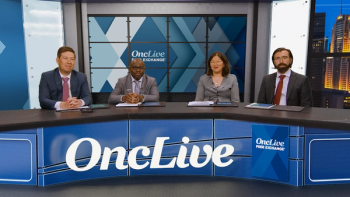
Novel Treatment Approaches for SCLC and Future Perspectives
ByTaofeek K. Owonikoko, MD, PhD; UPMC Hillman Cancer Center,Anne Chiang, MD, PhD, Yale School of Medicine Smilow Cancer Hospital,Jacob Sands, MD, Dana-Farber Cancer Institute,Konstantinos Leventakos, MD, PhD Mayo Clinic A panel of expert oncologists offer closing thoughts on the future treatment landscape and unmet needs in small-cell lung cancer.

2L Dosing Considerations and Management Strategies for SCLC
ByTaofeek K. Owonikoko, MD, PhD; UPMC Hillman Cancer Center,Anne Chiang, MD, PhD, Yale School of Medicine Smilow Cancer Hospital,Jacob Sands, MD, Dana-Farber Cancer Institute,Konstantinos Leventakos, MD, PhD Mayo Clinic Expert oncologists discuss important dosing considerations and treatment management strategies for lurbinectedin and other second-line therapy approaches in small-cell lung cancer.

LAGOON and IMFORTE Trials: Data Updates and Expert Insights
ByTaofeek K. Owonikoko, MD, PhD; UPMC Hillman Cancer Center,Anne Chiang, MD, PhD, Yale School of Medicine Smilow Cancer Hospital,Jacob Sands, MD, Dana-Farber Cancer Institute,Konstantinos Leventakos, MD, PhD Mayo Clinic A review of the LAGOON and IMFORTE trials with expert insights regarding the potential clinical implications of current and future study findings.

Patient Scenario 3: 2L Lurbinectedin Following 1L Combination IO Chemotherapy
ByTaofeek K. Owonikoko, MD, PhD; UPMC Hillman Cancer Center,Anne Chiang, MD, PhD, Yale School of Medicine Smilow Cancer Hospital,Jacob Sands, MD, Dana-Farber Cancer Institute,Konstantinos Leventakos, MD, PhD Mayo Clinic A panel of expert oncologists present the case of a 78-year-old woman who is treated with lurbinectedin following disease progress on first-line carboplatin, etoposide, and atezolizumab.

Evolving Treatment Strategies for SCLC in the Second-Line Setting and Beyond
ByTaofeek K. Owonikoko, MD, PhD; UPMC Hillman Cancer Center,Anne Chiang, MD, PhD, Yale School of Medicine Smilow Cancer Hospital,Jacob Sands, MD, Dana-Farber Cancer Institute,Konstantinos Leventakos, MD, PhD Mayo Clinic Panel experts discuss evolving treatment options for small-cell lung cancer in the second-line setting and beyond.

Real World Data for Combination Strategies With Chemotherapy and Immunotherapy in ES-SCLC
ByTaofeek K. Owonikoko, MD, PhD; UPMC Hillman Cancer Center,Anne Chiang, MD, PhD, Yale School of Medicine Smilow Cancer Hospital,Jacob Sands, MD, Dana-Farber Cancer Institute,Konstantinos Leventakos, MD, PhD Mayo Clinic Faculty discuss real world data for treatment approaches using chemotherapy in combination with immunotherapy in extensive-stage small-cell lung cancer.

Patient Scenario 2: 1L Management of ES-SCLC Positive for Synaptophysin With a Ki-67 Score of 90%
ByTaofeek K. Owonikoko, MD, PhD; UPMC Hillman Cancer Center,Anne Chiang, MD, PhD, Yale School of Medicine Smilow Cancer Hospital,Jacob Sands, MD, Dana-Farber Cancer Institute,Konstantinos Leventakos, MD, PhD Mayo Clinic Expert oncologists present the case of a 45-year-old woman with synaptophysin-positive, extensive-stage small-cell lung cancer with a Ki-67 score of 90%, who is treated with carboplatin, etoposide, and atezolizumab in the first-line setting, and provide their initial impressions.

ADRIATIC Trial and Investigational Treatment Approaches for Limited-Stage SCLC
ByTaofeek K. Owonikoko, MD, PhD; UPMC Hillman Cancer Center,Anne Chiang, MD, PhD, Yale School of Medicine Smilow Cancer Hospital,Jacob Sands, MD, Dana-Farber Cancer Institute,Konstantinos Leventakos, MD, PhD Mayo Clinic Faculty discuss potential treatment approaches for limited stage small-cell lung cancer currently under investigation in the ADRIATIC and other ongoing trials.

Combination Therapy Approaches With Chemotherapy and Immunotherapy in ES-SCLC
ByTaofeek K. Owonikoko, MD, PhD; UPMC Hillman Cancer Center,Anne Chiang, MD, PhD, Yale School of Medicine Smilow Cancer Hospital,Jacob Sands, MD, Dana-Farber Cancer Institute,Konstantinos Leventakos, MD, PhD Mayo Clinic Panel experts discuss strategies aimed at preventing and managing potential adverse events with first-line combination therapy approaches in extensive stage small-cell lung cancer.

CASPIAN: Long-Term Follow-up Data and Potential Predictors for Treatment Outcomes
ByTaofeek K. Owonikoko, MD, PhD; UPMC Hillman Cancer Center,Anne Chiang, MD, PhD, Yale School of Medicine Smilow Cancer Hospital,Jacob Sands, MD, Dana-Farber Cancer Institute,Konstantinos Leventakos, MD, PhD Mayo Clinic Expert oncologists discuss long-term data updates from the CASPIAN trial and the associated implications on clinical practice.

Expert Insights on First-line Treatment Strategies in SCLC
ByTaofeek K. Owonikoko, MD, PhD; UPMC Hillman Cancer Center,Anne Chiang, MD, PhD, Yale School of Medicine Smilow Cancer Hospital,Jacob Sands, MD, Dana-Farber Cancer Institute,Konstantinos Leventakos, MD, PhD Mayo Clinic An overview of first-line treatment options in SCLC with expert insights on important considerations in guiding treatment selection.

Patient Scenario 1: Newly Diagnosed ES-SCLC With Presence of Hepatic and Brain Metastases
ByTaofeek K. Owonikoko, MD, PhD; UPMC Hillman Cancer Center,Anne Chiang, MD, PhD, Yale School of Medicine Smilow Cancer Hospital,Jacob Sands, MD, Dana-Farber Cancer Institute,Konstantinos Leventakos, MD, PhD Mayo Clinic A panel of expert oncologists present the case of a 68-year-old man with newly diagnosed, extensive stage small-cell lung cancer and brain metastases, who is treated with carboplatin, etoposide, and durvalumab, and provide their initial impressions.

Evolving Role of Biomarkers in SCLC
ByTaofeek K. Owonikoko, MD, PhD; UPMC Hillman Cancer Center,Anne Chiang, MD, PhD, Yale School of Medicine Smilow Cancer Hospital,Jacob Sands, MD, Dana-Farber Cancer Institute,Konstantinos Leventakos, MD, PhD Mayo Clinic Faculty discuss the evolving role of molecular markers in small-cell lung cancer and the need for future research to identify improved biomarkers for targeted treatment options.

Impact of Disease Staging on Prognosis and Treatment in SCLC
ByTaofeek K. Owonikoko, MD, PhD,Anne Chiang, MD, PhD, Yale School of Medicine Smilow Cancer Hospital,Jacob Sands, MD, Dana-Farber Cancer Institute,Konstantinos Leventakos, MD, PhD Mayo Clinic Panel experts review disease staging for limited and extensive stage small-cell lung cancer and discuss the impact of staging on treatment selection.
